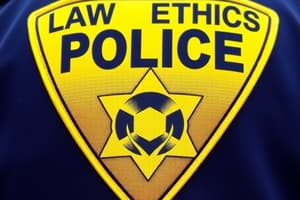Podcast
Questions and Answers
What does Ethical Skepticism imply about moral standards?
What does Ethical Skepticism imply about moral standards?
- Moral standards can vary by individual beliefs.
- Moral standards depend on societal acceptance.
- It is impossible to definitively state what is morally right or wrong. (correct)
- Moral standards are universally applicable.
According to the concept of Moral Conventionalism, what determines the validity of moral standards?
According to the concept of Moral Conventionalism, what determines the validity of moral standards?
- The laws established by governing bodies.
- Their acceptance within a specific cultural group. (correct)
- The emotional feelings of individuals.
- Universal moral principles that apply to all cultures.
What is the primary focus of Relative Ethics compared to Absolute Ethics?
What is the primary focus of Relative Ethics compared to Absolute Ethics?
- Detachment from cultural influences.
- The pursuit of personal happiness.
- Empathy and compassion in moral decision-making. (correct)
- Strict adherence to a universal moral code.
How does the quote by Plato differentiate between ethics and law?
How does the quote by Plato differentiate between ethics and law?
What does Moral Intuitionism suggest about moral truths?
What does Moral Intuitionism suggest about moral truths?
Which statement best captures the difference between ethics and law?
Which statement best captures the difference between ethics and law?
What is a key characteristic of relative ethics?
What is a key characteristic of relative ethics?
What is the purpose of laws within society?
What is the purpose of laws within society?
Which example illustrates a situation where an action might be legal but unethical?
Which example illustrates a situation where an action might be legal but unethical?
Which of the following best describes absolute ethics?
Which of the following best describes absolute ethics?
How does moral intuitionism differ from other ethical theories?
How does moral intuitionism differ from other ethical theories?
What role do social norms play in shaping ethical behavior?
What role do social norms play in shaping ethical behavior?
What distinguishes ethics from morality in terms of flexibility?
What distinguishes ethics from morality in terms of flexibility?
Which scenario best exemplifies civil disobedience as an ethical action?
Which scenario best exemplifies civil disobedience as an ethical action?
How do morality and ethics differ in their formation?
How do morality and ethics differ in their formation?
Which of the following best describes how law and ethics control human conduct?
Which of the following best describes how law and ethics control human conduct?
In the context of different ethical approaches, which statement is true about relative ethics?
In the context of different ethical approaches, which statement is true about relative ethics?
Which scenario illustrates an act that is ethically right but not legally permissible?
Which scenario illustrates an act that is ethically right but not legally permissible?
What is a primary characteristic of absolute ethics?
What is a primary characteristic of absolute ethics?
What primary conflict does the marketing executive face in promoting a harmful product?
What primary conflict does the marketing executive face in promoting a harmful product?
Why are there numerous ethical disputes in society, despite common ethical norms?
Why are there numerous ethical disputes in society, despite common ethical norms?
Flashcards are hidden until you start studying
Study Notes
Ethics vs. Law
- Compliance with law alone is insufficient for public servants; ethical sensibility is essential for effective duty performance.
- Ethical dilemmas arise when actions that are ethically right can conflict with legal standards.
Examples of Ethical and Legal Conflicts
- Ethically Right but Not Legally:
- A whistleblower revealing corporate misconduct acts ethically by promoting transparency, even if it violates non-disclosure agreements.
- Legally Right but Not Ethically:
- A politician on bail campaigning reflects legal compliance but raises ethical concerns about integrity and public trust.
Role of Law and Ethics
- Both law and ethics regulate human conduct to foster civilized social interaction.
- Laws are formal rules enforced by authorities, while ethics are personal beliefs shaped by cultural and societal norms.
Morality vs. Ethics
- Nature:
- Morals stem from individual beliefs; ethics arise from shared community standards.
- Origin:
- Morality is influenced by personal values; ethics come from codified behavioral guidelines.
- Formulation:
- Morals are rigid and deeply ingrained; ethics offer flexibility for interpretation.
- Subjectivity:
- Morality is subjective and varies per individual; ethics are more objective and widely applicable.
Ethical Disputes
- Ethical disagreements exist due to individual interpretations of shared norms influenced by life experiences.
Examples of Ethical Issues
- A marketing executive may see promoting an environmentally harmful product as morally wrong, despite company profit motives.
- Capital punishment and abortion are legal yet can be viewed as unethical due to their implications on life.
Key Similarities between Ethics and Law
- Both seek to outline acceptable societal behavior and aim to improve community well-being.
- Each can help resolve conflicts, often through formal legal processes that incorporate ethical standards.
Ethical Reasoning in Public Service
- Relative ethics involve considering individual circumstances, such as granting subsidies to struggling farmers, balancing empathy with strict rule adherence.
Philosophical Perspectives on Morality
- Ethical relativism suggests that moral beliefs vary across cultures and contexts, challenging the notion of universal morality.
- Moral conventionalism holds that moral standards are valid when accepted by specific cultural groups.
- Moral subjectivism claims that moral validity relies on personal choices.
- Ethical skepticism questions the ability to define absolute morality.
Overall Distinction between Law and Ethics
- Law represents the minimum behavior standards; ethics aspire to higher moral expectations.
- Good individuals may not need laws, while those with ill intentions often circumvent them, illustrating Plato's viewpoint on morality and governance.
Studying That Suits You
Use AI to generate personalized quizzes and flashcards to suit your learning preferences.




